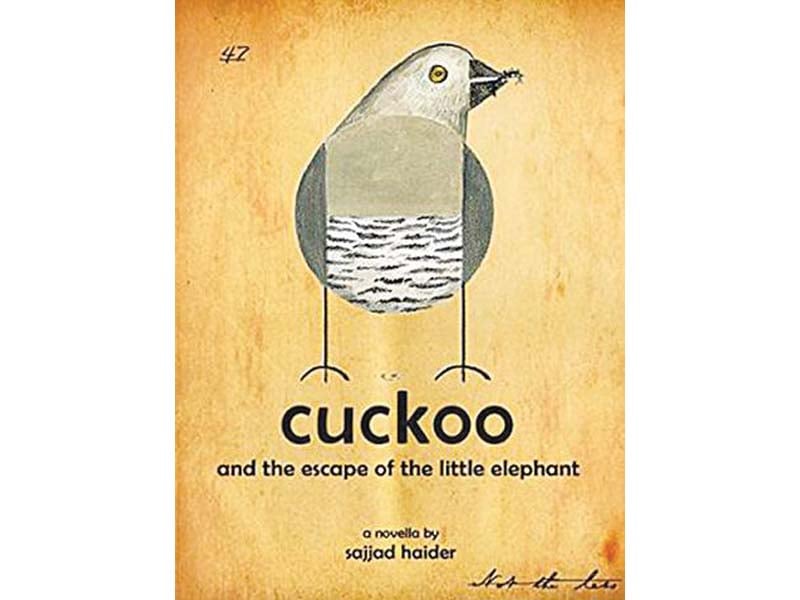
Sajjad Haider’s Cuckoo and the escape of the little elephant is a novella brimming with tales of adventure and suspense. Set against a backdrop of Partition, five sparrow quintuplets, a scrawny, stuttering rat, Berry, and a zebra-striped handsome cuckoo help a few-month’s-old weak elephant to escape from the tyranny of her turban-laden master.
Their entire odyssey is one thrilling and unusual experience, which culminates with the elephant’s seizure by the custodians of, first the Lahore Zoo and later, the Karachi Zoo. Through a rich saga of an animal ‘republic’, Haider yokes together questions of home, identity and sense of belonging.
While Haider has succeeded in many ways to create an engaging tale, the novella fails to captivate an older reader. The book’s inspiration from George Orwell’s The Animal Farm is evident and, while Haider endeavoured to present it in a traditional setting, unlike Orwell, he did not succeed at exploring many of the themes he attempted to at the commencement of the novella.
Telling tales in translation
With a historical backdrop of Partition, a reader anticipates questioning his notion of ‘home’ and ‘place’. The author offers this theme as loose threads throughout the book — “the elephant to decide which way it wanted to go,” and “it must return home,” but does not weave the entire fabric. Haider also does not seem to trust the reader much. He introduces humour at many points but also explains what part the reader is supposed to find funny.
“I knew you wouldn’t lift a FEATHER,” highlighting the pun or stating what was to be appreciated in Professor Watayo’s remark that it is an ‘animal republic’ and ‘not a kingdom’, assumes the reader is either less intelligent or unaware of subtle humour.
In his attempt of ‘telling’ instead of ‘showing’ much in the book, Haider begins to state the obvious, which makes one think the book will only appeal to young readers and children. Moreover, awkward sentence construction, typos and many spelling errors accentuate the lack of refinement in the novella.
The soldier whose sword is a pen
Haider, however, managed to develop his characters extremely well. Every animal had unique and well-thought-out characteristics. The chatty and sane cuckoo, the righteous myna, the indecisive elephant, the arrogant yet compassionate sparrow quintuplets and the ostracised rat had traits very specific to themselves. The rats’ organisational skills, the parrots’ tendency to get caught easily and the cats’ surreptitious behaviour were captured by the author quite well. Haider also does a good job at presenting common knowledge as part of the plot or as justification for the creatures’ idiosyncrasies. For instance, cuckoo’s willful assistance in helping the elephant reach its home despite not receiving promised worms was because it never had a place to call home, since cuckoos were dropped in other birds’ nests while they were still eggs or the quintuplets’ eagerness to get the mother elephant and baby elephant to unite since sparrows had a ‘maternal nature’. Moreover, Haider also linked many other facts rather cohesively in his novella. He mentioned the great memory the cuckoo possessed very early in the book and revealed this again towards the end — the sparrow’s superstition regarding creatures blinking their eyes becomes the thoughts of the cuckoo when Professor Watayo blinks excessively while writing the letter to the Indian government refusing to return the elephant.
With all its pros and cons, Cuckoo is a book with potential for either a great plot if the themes touched upon are developed further or a great series with animal tales for children.
The lost world of Ishtiaq Ahmed
Title: Cuckoo and the escape of the little elephant
Author: Sajjad Haider
Pages: 121
Price: $2.99 (Kindle version)
The writer is a subeditor on The Express Tribune’s Peshawar desk
Published in The Express Tribune, December 20th, 2015.
Like Life & Style on Facebook, follow @ETLifeandStyle on Twitter for the latest in fashion, gossip and entertainment.
















1714131462-0/WhatsApp-Image-2024-04-26-at-4-21-45-PM-(1)1714131462-0-270x192.webp)







1714024018-0/ModiLara-(1)1714024018-0-270x192.webp)









COMMENTS
Comments are moderated and generally will be posted if they are on-topic and not abusive.
For more information, please see our Comments FAQ